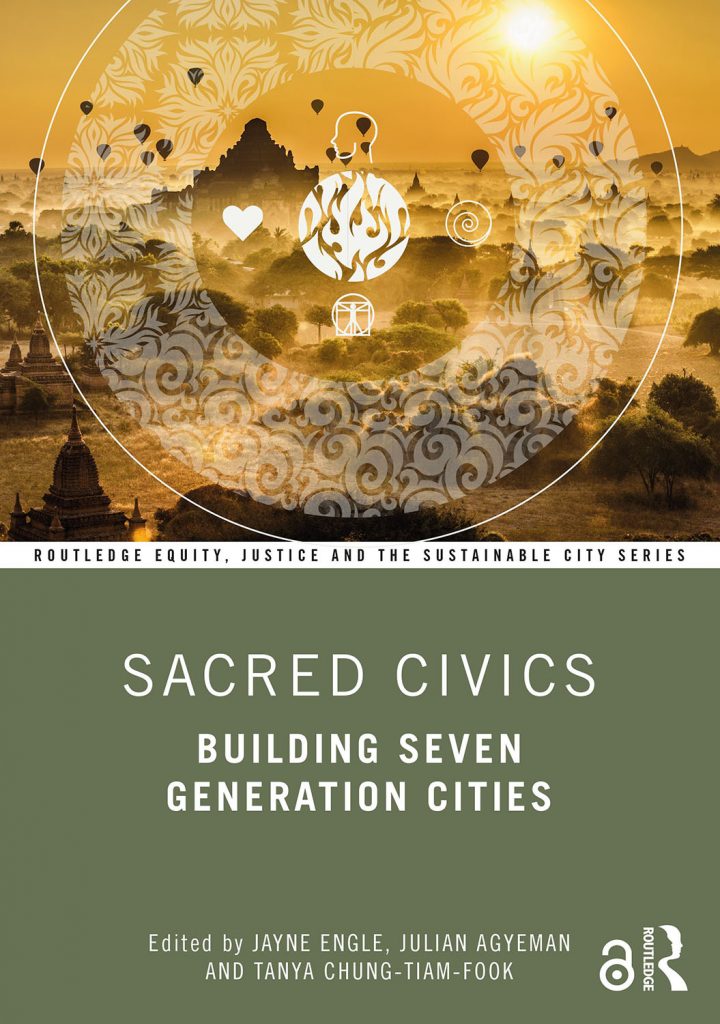Sacred Civics: Building Seven Generation Cities
 Published by: Routledge
Published by: RoutledgeRelease Date: May 13, 2022
Pages: 266
ISBN13: 978-1032059112
Buy the Book: Amazon, Barnes & Noble, Bookshop, IndieBound, Routledge
Overview
Sacred Civics argues that societal transformation requires that spirituality and sacred values are essential to reimagining patterns of how we live, organize and govern ourselves, determine and distribute wealth, inhabit and design cities, and construct relationships with others and with nature.
The book brings together transdisciplinary and global academics, professionals, and activists from a range of backgrounds to question assumptions that are fused deep into the code of how societies operate, and to draw on extraordinary wisdom from ancient Indigenous traditions; to social and political movements like Black Lives Matter, the commons, and wellbeing economies; to technologies for participatory futures where people collaborate to reimagine and change culture. Looking at cities and human settlements as the sites of transformation, the book focuses on values, commons, and wisdom to demonstrate that how we choose to live together, to recognize interdependencies, to build, grow, create, and love—matters.
Using multiple methodologies to integrate varied knowledge forms and practices, this truly ground-breaking volume includes contributions from renowned and rising voices. Sacred Civics is a must-read for anyone interested in intersectional discussions on social justice, inclusivity, participatory design, healthy communities, and future cities.
Reviews
"Creative, hopeful, audacious. Here is a book that the city building professions have been, unknowingly, waiting for. Transcending technical and policy ‘fixes’, this book addresses the cultural and spiritual dimensions of shaping cities as if people, land, and nature were sacred. An impressive, pluriversal collection of essays, asking arguably THE most important question of our era: what will it take to build seven generation cities?"
—Leonie Sandercock, FRSC, Professor in Community Planning, University of British Columbia, Canada
"Sacred Civics offers a forward-looking framework that re-imagines what our cities can be if we change our mindset to a more relational one. Through the voices of scholars and practitioners, the book gives a blueprint for how to put into practice the transformative ideas and principles so well articulated here. A wonderful achievement."
—Sheila R. Foster, Professor at Georgetown University, USA
"The old metaphors for cities have run dry. Cities as machines or technologies or mechanisms aren’t getting us anywhere. They aren't computers…they aren’t smart. But they are systems that are built and managed by communities of humans and their non-human allies. As such, the values that we bear in mind as we do the work of city-ing matters. The work that we do together matters. It should be seen as sacred. Even the act of figuring out what this means is something that we should do together, and as such is a sacred process. This book ties many of the relevant threads together into the pattern we need for doing the work of cities in the 21st century. It liberates us from the mechanistic models of the past. It liberates us to figure out what's next for cities. Those of us who work to build just cities and communities need this book."
—Nigel Jacob, Co-Chair / Co-Founder, Mayor's Office of New Urban Mechanics, USA
"Nature and the sacred have long been banished from the city. Yet can cities become the site of wisdom, wholeness, and healing? This is the urgent question this unique and wonderfully creative volume tackles by weaving together indigenous ontologies, the relational turn in urban studies, and decoloniality to persuasively develop the principles of "sacred civics" and "seven-generation cities" as the foundation for a substantial rethinking of city building and the democratization of city futures. Chung-Tiam-Fook, Agyeman, and Engle have assembled a truly outstanding and diverse group of indigenous and nonindigenous writers and artists, including some of today’s leading scholars in urban studies, to offer us a cogent framework of urban design as a praxis for the just co-existence of all within a living cosmos. Their call for a relational accountability for the urban worlds we design, grounded on a renewed Earth spirituality and a paradigm of interdependence and care, couldn’t be timelier. Along the way, readers are invited to inspiring and rigorous analyses on the implications of such rethinking for commons, property, governance, nature, and the economy. The book will be of great value to urban planners and designers as well as to scholars and students in indigenous and decolonial studies and those concerned with urban natures, transitions, pluriversality, and the sacred."
—Arturo Escobar, Arturo Escobar, Professor of Anthropology Emeritus, University of North Carolina, USA
"Cities need big ideas to fill small spaces. This book reveals how life's details might better correspond with life's broader sources to create healthier urban futures. I am impressed with the rich and varied angles of vision found in Sacred Civics. The book is practical and poetic. It cultivates hope even as it recognizes the significant challenges we face."
—John Borrows, Canada Research Chair in Indigenous Law, University of Victoria, Canada